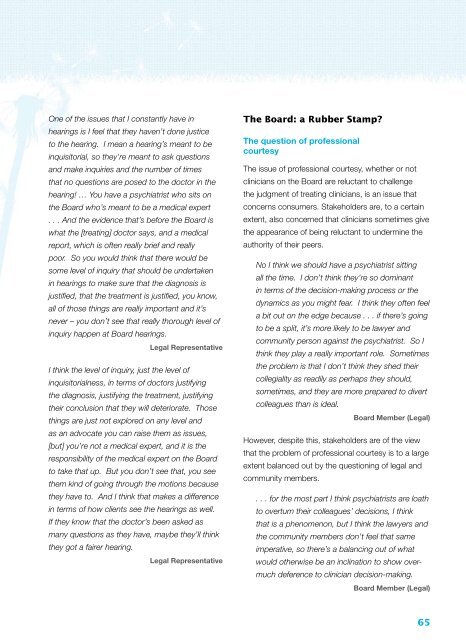Lacking Insight - Community Law
Lacking Insight - Community Law
Lacking Insight - Community Law
- No tags were found...
You also want an ePaper? Increase the reach of your titles
YUMPU automatically turns print PDFs into web optimized ePapers that Google loves.
One of the issues that I constantly have inhearings is I feel that they haven’t done justiceto the hearing. I mean a hearing’s meant to beinquisitorial, so they’re meant to ask questionsand make inquiries and the number of timesthat no questions are posed to the doctor in thehearing! … You have a psychiatrist who sits onthe Board who’s meant to be a medical expert. . . And the evidence that’s before the Board iswhat the [treating] doctor says, and a medicalreport, which is often really brief and reallypoor. So you would think that there would besome level of inquiry that should be undertakenin hearings to make sure that the diagnosis isjustified, that the treatment is justified, you know,all of those things are really important and it’snever – you don’t see that really thorough level ofinquiry happen at Board hearings.Legal RepresentativeI think the level of inquiry, just the level ofinquisitorialness, in terms of doctors justifyingthe diagnosis, justifying the treatment, justifyingtheir conclusion that they will deteriorate. Thosethings are just not explored on any level andas an advocate you can raise them as issues,[but] you’re not a medical expert, and it is theresponsibility of the medical expert on the Boardto take that up. But you don’t see that, you seethem kind of going through the motions becausethey have to. And I think that makes a differencein terms of how clients see the hearings as well.If they know that the doctor’s been asked asmany questions as they have, maybe they’ll thinkthey got a fairer hearing.Legal RepresentativeThe Board: a Rubber Stamp?The question of professionalcourtesyThe issue of professional courtesy, whether or notclinicians on the Board are reluctant to challengethe judgment of treating clinicians, is an issue thatconcerns consumers. Stakeholders are, to a certainextent, also concerned that clinicians sometimes givethe appearance of being reluctant to undermine theauthority of their peers.No I think we should have a psychiatrist sittingall the time. I don’t think they’re so dominantin terms of the decision-making process or thedynamics as you might fear. I think they often feela bit out on the edge because . . . if there’s goingto be a split, it’s more likely to be lawyer andcommunity person against the psychiatrist. So Ithink they play a really important role. Sometimesthe problem is that I don’t think they shed theircollegiality as readily as perhaps they should,sometimes, and they are more prepared to divertcolleagues than is ideal.Board Member (Legal)However, despite this, stakeholders are of the viewthat the problem of professional courtesy is to a largeextent balanced out by the questioning of legal andcommunity members.. . . for the most part I think psychiatrists are loathto overturn their colleagues’ decisions, I thinkthat is a phenomenon, but I think the lawyers andthe community members don’t feel that sameimperative, so there’s a balancing out of whatwould otherwise be an inclination to show overmuchdeference to clinician decision-making.Board Member (Legal)65
















